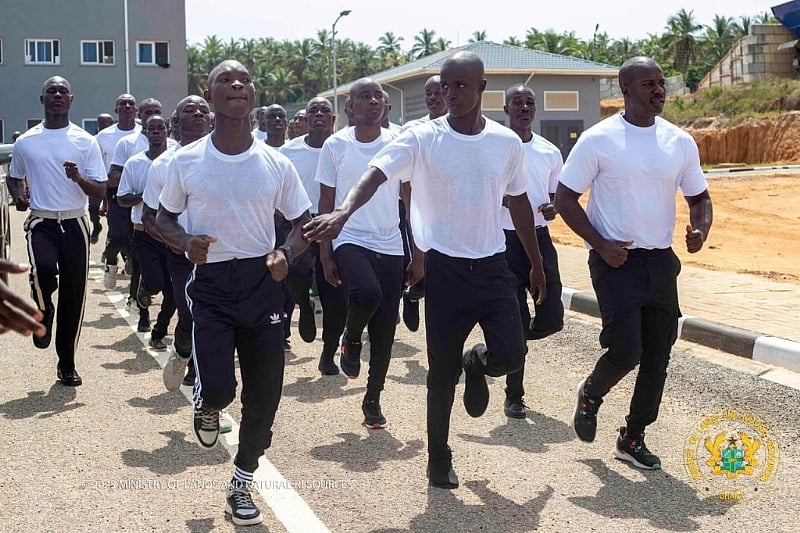The Ghanaian government, through the Ministry of Lands and Natural Resources and its agency, the Minerals Commission, has launched a significant initiative to combat illegal mining and protect the nation’s water bodies. This initiative involves the deployment of a specialized team known as the Blue Water Guards. These guards, trained by the Ghana Navy, are tasked with patrolling riverbanks and reporting illegal mining activities that threaten water quality and ecological health. This deployment represents a concerted effort to address the pervasive problem of illegal mining, often referred to as “galamsey,” which has caused widespread environmental damage, particularly to Ghana’s rivers. The initial deployment of ten Blue Water Guards to the Wassa Japa enclave in the Wassa Amenfi East Municipality marks the beginning of a broader strategy to extend this protective force across other affected areas in the Western Region, including Prestea, Huni-Valley, and Simpa.
The Blue Water Guards are not intended to act in isolation. Their effectiveness relies heavily on collaboration with various security agencies, including the military, police, national security apparatus, and local district assemblies. This interagency cooperation is crucial for coordinating efforts, sharing intelligence, and ensuring a comprehensive approach to tackling illegal mining. The initiative also emphasizes community engagement and education. Sensitization forums, such as the one held in Japa, are designed to inform local communities about the role of the Blue Water Guards, address concerns, and foster a sense of shared responsibility in protecting water resources. The Minerals Commission has underscored that the guards are not an antagonistic force but rather a support system aimed at assisting communities in combating the detrimental effects of illegal mining.
The mandate of the Blue Water Guards extends beyond mere surveillance. They are empowered to report illegal activities, gather evidence, and potentially assist in apprehending those engaged in illicit mining practices. The Minerals Commission has issued a stern warning that any individual who obstructs or attacks the guards in the execution of their duties will face legal consequences. This firm stance underscores the government’s commitment to enforcing environmental regulations and protecting its natural resources. The long-term success of this initiative hinges on building trust and cooperation between the Blue Water Guards and the communities they serve.
The introduction of the Blue Water Guards has been met with positive reception from local communities and government officials. Stakeholders, including chiefs, traditional leaders, assembly members, religious leaders, and members of parliament, have expressed their support for the initiative, recognizing its importance in safeguarding water resources for future generations. This collaborative spirit is essential for ensuring the long-term sustainability of the program and fostering a sense of collective responsibility for environmental protection. The government has emphasized the ethical and professional conduct expected of the Blue Water Guards, highlighting the need for transparency and accountability in their operations.
The community sensitization forum in Japa served as a platform for dialogue and information sharing. Mr. Steven Agbo, a Social Scientist at the Minerals Commission, explained the purpose and function of the Blue Water Guards, emphasizing their role in protecting water bodies and mitigating the environmental consequences of illegal mining. He reassured the community that the guards’ presence was not intended to cause harm but to assist in tackling illegal mining activities. The forum also provided an opportunity for community members to raise concerns and seek clarification regarding the initiative.
The collaborative nature of this initiative is further exemplified by the active involvement of local government officials. The Municipal Chief Executive and Member of Parliament for the area have pledged their support, recognizing the importance of protecting water resources and addressing the challenges posed by illegal mining. This commitment from local leadership reinforces the government’s efforts and strengthens the potential for long-term success. The combined efforts of the Minerals Commission, local authorities, security agencies, and community stakeholders represent a comprehensive and integrated approach to tackling the complex problem of illegal mining and protecting Ghana’s precious water resources. The initiative acknowledges that sustainable development requires a multi-faceted strategy that involves not only enforcement but also education, community engagement, and interagency cooperation. The deployment of the Blue Water Guards marks a significant step towards achieving these goals and ensuring a healthier environment for current and future generations.














